Related Research Articles
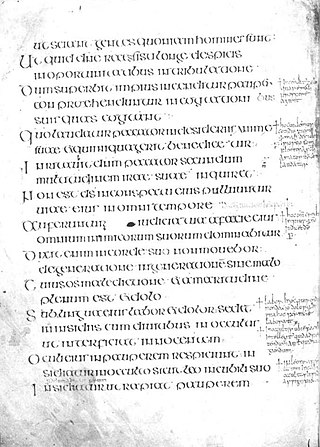
Psalm 9 is the ninth psalm of the Book of Psalms, beginning in English in the King James Version: "I will praise thee, O LORD, with my whole heart; I will shew forth all thy marvellous works." In Latin, it is known as "Confitebor tibi, Domine". The topic of the psalm is that the success of evil is only temporary, and in the end, the righteous will endure. Psalm 10 is considered part of Psalm 9 in the Greek Septuagint and in most pre-Reformation Christian Bibles. These two consecutive psalms have the form of a single acrostic Hebrew poem.
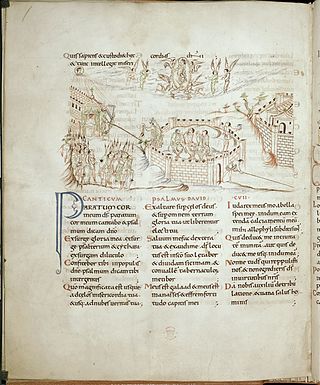
Psalm 108 is the 108th psalm in the Book of Psalms. The first verse attributes it to King David, the author of many Psalms. It is a hymn, beginning in English in the King James Version: "O God, my heart is fixed; I will sing and give praise, even with my glory". In Latin, it is known as "Paratum cor meum Deus". In the slightly different numbering system used in the Greek Septuagint version of the bible, and in the Latin Vulgate, this psalm is Psalm 107.

Psalm 30 is the 30th psalm of the Book of Psalms, beginning in English in the King James Version: "I will extol thee, O LORD; for thou hast lifted me up". The Book of Psalms is part of the third section of the Hebrew Bible, and a book of the Christian Old Testament. In the slightly different numbering system used in the Greek Septuagint version of the Bible and in the Latin Vulgate, this psalm is Psalm 29. In Latin, it is known as "Exaltabo te Domine". It is a psalm of thanksgiving, traditionally ascribed to David upon the building of his own royal palace.
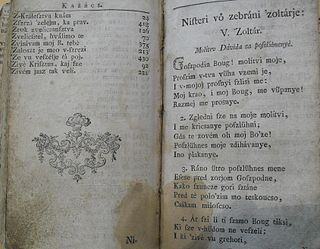
Psalm 5 is the fifth psalm of the Book of Psalms, beginning in English in the King James Version: "Give ear to my words, O LORD, consider my meditation". In Latin, it is known as "Verba mea auribus percipe Domine". The psalm is traditionally attributed to David. It is a reflection of how the righteous man prays for deliverance not only for freedom from suffering, but to allow himself to be able to serve God without distraction. The New King James Version entitles it "A Prayer for Guidance".
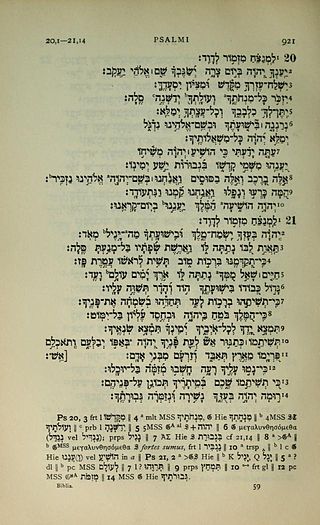
Psalm 21 is the 21st psalm of the Book of Psalms, beginning in English in the King James Version: "The king shall joy in thy strength". The Book of Psalms is part of the third section of the Hebrew Bible, and a book of the Christian Old Testament. In the slightly different numbering system used in the Greek Septuagint and Latin Vulgate translations of the Bible, this psalm is Psalm 20. In Latin, it is known by the incipit, "Domine in virtute tua". The psalm is attributed to David.
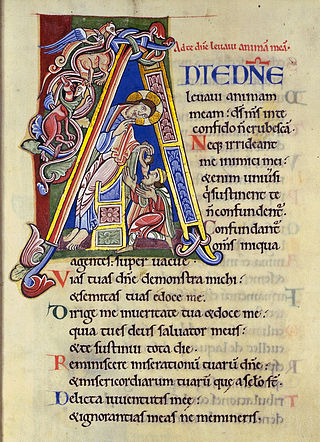
Psalm 25 is the 25th psalm of the Book of Psalms, beginning in English in the King James Version: "Unto thee, O LORD, do I lift up my soul.". The Book of Psalms is part of the third section of the Hebrew Bible, and a book of the Christian Old Testament. In the slightly different numbering system used in the Greek Septuagint and Latin Vulgate translations of the Bible, this psalm is Psalm 24. In Latin, it is known as "Ad te Domine levavi animam meam". The psalm, attributed to David, has the form of an acrostic Hebrew poem.
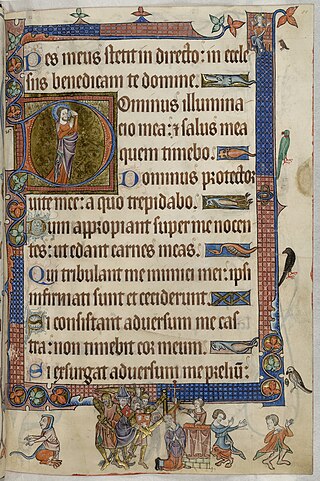
Psalm 27 is the 27th psalm of the Book of Psalms, beginning in English in the King James Version: "The LORD is my light and my salvation; whom shall I fear?". The Book of Psalms is part of the third section of the Hebrew Bible, and a book of the Christian Old Testament. In the slightly different numbering system used in the Greek Septuagint and Latin Vulgate translations of the Bible, this psalm is Psalm 26. In Latin, it is known as "Dominus illuminatio mea".
Psalm 28 is the 28th psalm of the Book of Psalms, beginning in English in the King James Version: "Unto thee will I cry, O LORD my rock;". The Book of Psalms is part of the third section of the Hebrew Bible, and a book of the Christian Old Testament. In the slightly different numbering system used in the Greek Septuagint and Latin Vulgate translations of the Bible, this psalm is Psalm 27. In Latin, it is known by the incipit, "Exaudi vocem deprecationis meae".

Psalm 32 is the 32nd psalm of the Book of Psalms, beginning in English in the King James Version: "Blessed is he whose transgression is forgiven". The Book of Psalms is part of the third section of the Hebrew Bible, and a book of the Christian Old Testament. In the slightly different numbering system used in the Greek Septuagint and Latin Vulgate translations of the Bible, this psalm is Psalm 31. In Latin, it is known by the incipit, "Beati quorum". The psalmist expresses the joy of being released from great suffering.
Psalm 35 is the 35th psalm of the Book of Psalms, beginning in English in the King James Version: "Plead my cause, O LORD, with them that strive with me: fight against them that fight against me." It is titled there: The Lord the Avenger of His People. The Book of Psalms is part of the third section of the Hebrew Bible, and a book of the Christian Old Testament. In the slightly different numbering system used in the Greek Septuagint and Latin Vulgate translations of the Bible, this psalm is Psalm 34. In Latin, it is known by the incipit, "Iudica Domine nocentes me". It is generally attributed to King David, although some commentators attribute it to the prophet Jeremiah.

Psalm 40 is the 40th psalm of the Book of Psalms, beginning in English in the King James Version: "I waited patiently for the LORD". The Book of Psalms is part of the third section of the Hebrew Bible, and a book of the Christian Old Testament. In the slightly different numbering system used in the Greek Septuagint and Latin Vulgate translations of the Bible, this psalm is Psalm 39. In Latin, it is known by the incipit, "Expectans expectavi Dominum". It is described by the Jerusalem Bible as a "song of praise and prayer for help".

Psalm 138 is the 138th psalm of the Book of Psalms, beginning in English in the King James Version: "I will praise thee with my whole heart". In Latin, it is known as "Confitebor tibi Domine in toto corde meo". The psalm is a hymn psalm.

Psalm 54 is the 54th psalm of the Book of Psalms, beginning in English in the King James Version: "Save me, O God, by thy name, and judge me by thy strength". In the slightly different numbering system used in the Greek Septuagint and Latin Vulgate translations of the Bible, this psalm is Psalm 53. In Latin, it is known as "Deus in nomine tuo salvum me fac", Attributed to David, it was written for one who finds oneself betrayed by a friend.
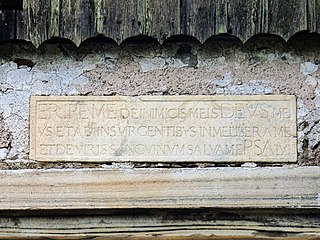
Psalm 59 is the 59th psalm of the Book of Psalms, beginning in English in the King James Version: "Be merciful unto me, O God, be merciful unto me". In the slightly different numbering system of the Greek Septuagint version of the Bible and the Latin Vulgate, this psalm is Psalm 56. In Latin, it is known as "Eripe me de inimicis meis Deu". It is described as "a prayer composed when Saul sent messengers to wait at the house in order to kill him", and commentator Cyril Rodd describes it as a "vigorous plea for the destruction of the psalmist's enemies".

Psalm 68 is the 68th psalm of the Book of Psalms, or Psalm 67 in Septuagint and Vulgate numbering. In the English of the King James Version it begins "Let God arise, let his enemies be scattered". In the Latin Vulgate version it begins "Exsurgat Deus et dissipentur inimici eius". It has 35 verses. Methodist writer Arno C. Gaebelein calls it "The Great Redemption Accomplished" and describes it as "one of the greatest Psalms".

Psalm 71 is the 71st psalm of the Book of Psalms, beginning in English in the King James Version: "In thee, O LORD, do I put my trust: let me never be put to confusion". It has no title in the Hebrew version. In the slightly different numbering system used in the Greek Septuagint and Latin Vulgate translations of the Bible, this psalm is Psalm 70. In Latin, it is known as "In te Domine speravi".

Psalm 72 is the 72nd psalm of the Book of Psalms, beginning in English in the King James Version: "Give the king thy judgments, O God, and thy righteousness unto the king's son". In the slightly different numbering system used in the Greek Septuagint and Latin Vulgate translations of the Bible, this psalm is Psalm 71. In Latin, it is known as "Deus iudicium tuum regi da". Traditionally seen as being written by King Solomon, its heading may be translated 'to or for Solomon'.

Psalm 81 is the 81st psalm of the Book of Psalms, beginning in English in the King James Version: "Sing aloud unto God our strength". In the slightly different numbering system used in the Greek Septuagint and Latin Vulgate translations of the Bible, this psalm is Psalm 80. In Latin, it is known as "Exultate deo adiutori nostro". It is one of the 12 Psalms of Asaph. Its themes relate to celebration and repentance. In the New King James Version its sub-title is "An Appeal for Israel's Repentance".
Psalm 86 is the 86th psalm of the Book of Psalms. It is attributed to David. In the slightly different numbering system used in the Greek Septuagint and Latin Vulgate translations of the Bible, this psalm is Psalm 85.

Psalm 102 is the 102nd psalm of the Book of Psalms, beginning in English in the King James Version: "Hear my prayer, O LORD, and let my cry come unto thee." In Latin, it is known as "Domine exaudi orationem meam".
References
- ↑ Childs, Brevard (1979). Introduction to the Old Testament as Scripture. Philadelphia: Fortress Press. pp. 515–517.
- ↑ Nelson, Thomas (2018). NKJV Study Bible. Thomas Nelson. pp. 855–858. ISBN 978-0785220732.
- ↑ Buttrick, George Arthur (1957). The Interpreter's Bible: Psalms. Proverbs. Abingdon-Cokesbury Press. p. 529.